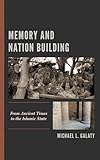Memory and nation building: from ancient times to the Islamic state
Material type: TextPublication details: Rowman & Littlefield Publishers 2018 LanhamDescription: xxiii, 200 p.: ill. Includes bibliography and indexISBN:
TextPublication details: Rowman & Littlefield Publishers 2018 LanhamDescription: xxiii, 200 p.: ill. Includes bibliography and indexISBN: - 9780759122604
- 320.1 G2M3
| Item type | Current library | Item location | Collection | Shelving location | Call number | Status | Date due | Barcode | |
|---|---|---|---|---|---|---|---|---|---|
| Books | Vikram Sarabhai Library | Rack 13-B / Slot 472 (0 Floor, West Wing) | Non-fiction | General Stacks | 320.1 G2M3 (Browse shelf(Opens below)) | Available | 202077 |
Table of contents
Intro
Contents
Acknowledgments
List of Figures and Tables
Prologue: Bosnia
Preface: Memory: An Effort After Meaning
1: Introduction: Collective Memory Defined
2: Egypt: Unification
3: Greece: Diversification
4: Albania: Adaptation
5: Conclusion: All These Memories Have Gone
Epilogue: Alabama
Bibliography
Index.
Memory and Nation Building addresses the complex topic of collective memory, first described by sociologist Maurice Halbwachs in the first half of the 20th century. Author Michael Galaty argues that the first states appropriated traditional collective memory systems in order to form. With this in mind, he compares three Mediterranean societies - Egypt, Greece, and Albania - each of which experienced very different trajectories of state formation. Galaty attributes these differences to varying responses to collective memory in all three places through time, with climaxes in the Ottoman period, during which all three were under Ottoman control. Egypt was characterized by deeply meaningful memory tropes concerning national unity, which spanned all of Egyptian history, while Greece experienced memory fragmentation, a condition exacerbated by periods of imperial conquest. Albania adopted and assimilated when faced with foreign domination, such that an indigenous Albanian state did not form until 1912.
Galaty builds a diachronic model of state formation and its relationship to memory and political control. Memory and Nation Building culminates in an analysis of modern collective memory systems and resistance to those systems, which are often framed as conflicts over “heritage”. The formation and eventual fall of the short-lived Islamic State serve as an example of extreme memory work, with lessons for other modern nations.
https://rowman.com/ISBN/9780759122604/Memory-and-Nation-Building-From-Ancient-Times-to-the-Islamic-State
There are no comments on this title.

